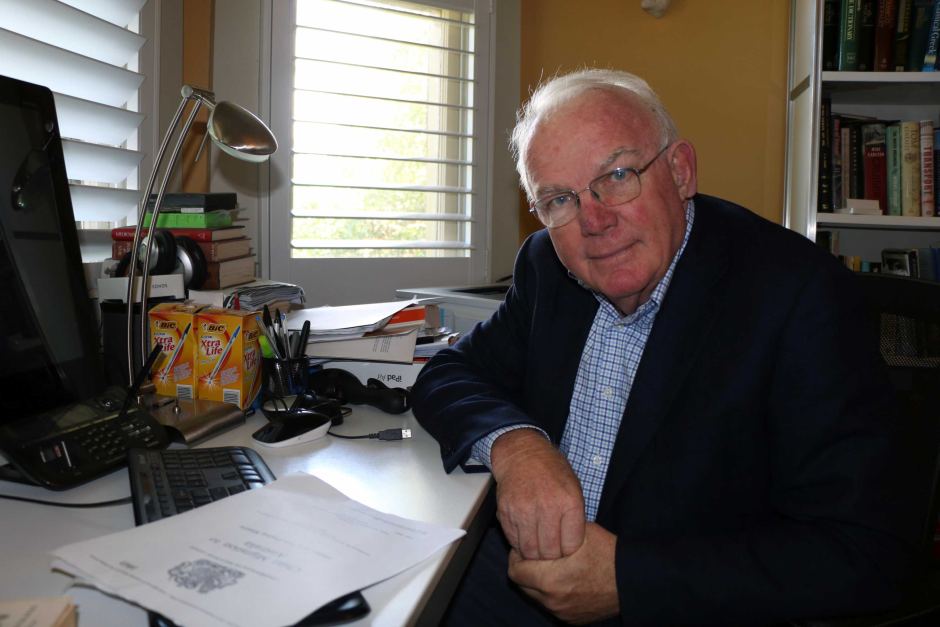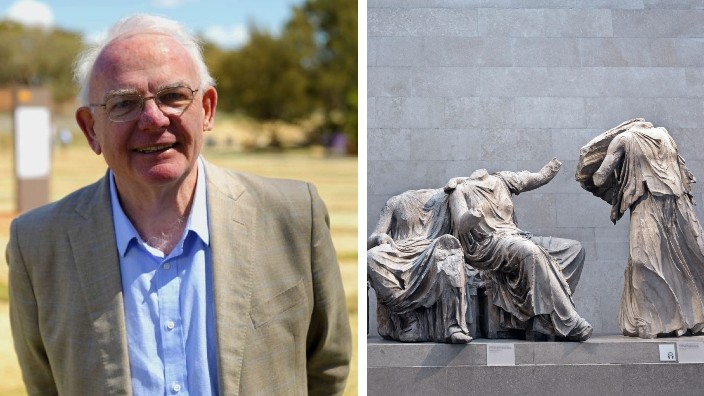In recent months, the Greek government has re-asserted its longstanding demand for the return of the Parthenon Sculptures from the British Museum. This demand was explicitly ruled out by UK Prime Minister, Boris Johnson, in March this year when he reiterated the government’s “firm longstanding position” that the sculptures “were legally acquired by Lord Elgin under the appropriate laws of the time.”
This provocative statement caused outrage across Europe and the world, with many international committees coming together in one voice to renew their passionate support for the case of the return of the Sculptures.
Ultimately, these expressions of support became a crescendo of neo-Philhellenism and one of the strongest voices among the crescendo was David Hill, who is the Chairman of an Australian committee known as Australians for the Return of the Parthenon Sculptures.
READ MORE: Australia takes the lead in demanding the return of the Parthenon Marbles to Greece.
Mr Hill, who is also the former chairman of the Australian Broadcasting Corporation, tells The Greek Herald exclusively that his passion for the Parthenon Sculptures and Greece began over 45 years ago when he first visited the country.

“I first went to Greece in 1973… and it was like a magnet, it was the beginning of a love affair. The relationship became deeper and richer over the years and I became absorbed in the history, spirit and culture of Greece,” Mr Hill explains.
“I visited the Acropolis on my first trip to Greece and after that… I went on to London and an old English friend took me to see the Elgin collection in the British Museum and I think I was struck by the injustice of the marbles being in London.”
From ‘cultural diplomacy’ to litigation:
Ever since then, Mr Hill has been working tirelessly to persuade the UK government to return the Parthenon Sculptures to their rightful place in Greece.
For four years from 1999, Mr Hill was the Executive Director of the British Committee for the Reunification of the Parthenon Marbles in London. Later, from 2006 to 2016, he was the President of the International Association which encompasses all the committees, and he is now in his current position.
“Over the years I’ve worked with the Chairman of the Board of the British Museum, various arts and culture ministers in the UK government, and I’ve worked with, I think, 11 Greek culture ministers and six Prime Ministers. I also give… my views to the Greek government on a regular basis,” Mr Hill explains.
READ MORE: The Plundered Past of the Parthenon Sculptures: How the Greeks can get back their marbles.

“Most of my work is trying to persuade the British to give the sculptures back and trying to generate more public opinion and support for the return of the sculptures.
“You’ve got the situation now where, particularly over the last 20 years, most of the public opinion polls around the world strongly support the marbles going back… the problem is we haven’t changed the mind of the British.”
To do this, Mr Hill says, “the Greek government ought to litigate or to sue” because the strategy that has been employed since Melina Mercouri has been “cultural diplomacy,” but it has produced “no results.”
“I think it’s a Greek cultural thing. In Australia, America, Britain, if you can’t agree on an important issue, seeking the decision of an independent court or tribunal… is considered a civilised thing to do,” Mr Hill describes.
READ MORE: Dr Artemis Papathanassiou to discuss Greek “cultural diplomacy” during video conference
“But there are a lot of people in Greece who think it is almost a declaration of war, they feel uncomfortable, they feel it’s an aggressive thing to do. So trying to persuade the Greeks they should explore their legal options is proving very difficult.”
The role of Philhellenes in facilitating reunification:
One way Mr Hill desperately tried to persuade the Greeks to pursue litigation was in 2014 when he took three of the best international lawyers to Athens to advise then-Prime Minister, Antonis Samaras, of the Greek government’s legal options. These three people were Geoffrey Robertson QC, fellow barrister, Amal Clooney, and the late Professor Norman Palmer.
Mr Hill says that at the time, Mrs Clooney had just married famous actor, George Clooney, and this star factor ensured the spotlight was firmly focused on the reunification of the sculptures.
READ MORE: How the Parthenon Marbles brought power couple George Clooney and wife Amal together.
“I’ve never seen anything like it… but what it did was it made the marbles the news story around the world,” Mr Hill explains to The Greek Herald.
Of course, it must be mentioned though that to this day the UK government and British Museum are still no closer to returning the Sculptures, and Mr Hill says Philhellenes and the Greek diaspora need to keep pushing and building public support.
This could involve supporting Greece through organisations such as the Hellenic Initiative, or even attending events such as the upcoming Australian book launch of Geoffrey Robertson QC’s new book, ‘Who Owns History,’ at The Governors Centre in Moore Park on June 5.
Every little bit helps and as Mr Hill stresses, it’s only a matter of time before the sculptures are rightfully returned to their homeland.
READ MORE: An architectural story worth knowing: The Acropolis museum.
“It’s not often in history that a great wrong can’t be righted. In this case, it can be. They can be returned where they belong – to Greece. At the end of the day, it’s wrong for the British to keep them there… and I’m confident… that eventually right will prevail,” Mr Hill passionately concludes.
*NOTE: If you’d like to attend Geoffrey Robertson QC’s book launch, which is organised by the Athenian Association of NSW in collaboration with the Australians for the Return of the Parthenon Sculptures, it will be held on Saturday, June 5 at 6pm at The Governors Centre (558 Cleveland Street, Moore Park, NSW, 2021).


